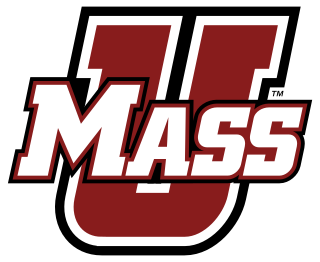Related Research Articles

Edward Francis Healey Jr. was an American professional football player in the National Football League (NFL). Regarded as one of the best linemen in the league's early days, Healey was inducted into the Pro Football Hall of Fame as part of its second induction class in 1964. He was also named in 1969 to the NFL 1920s All-Decade Team. In 1974, he was also inducted into the College Football Hall of Fame.

Frank William "Menty" Keaney was an American football, basketball, and baseball coach and college athletics administrator. As a college men's basketball coach, he was known as the architect of modern "run-and-shoot" basketball and the inventor of the fast break.

Daniel Ralph Glaze was an American sportsman and coach who played as a right-handed pitcher in Major League Baseball, and later became a football and baseball coach and administrator at several colleges.
Charles Christopher "Chuckin' Charlie" O'Rourke was an American football player and coach. He played college football as a quarterback at Boston College and professionally with Chicago Bears of the National Football League (NFL) and the Los Angeles Dons and Baltimore Colts of the All-America Football Conference (AAFC). O'Rourke quarterbacked the Boston College Eagles football team to one of its most famous wins. His 24-yard run late in the fourth quarter gave the 1940 Eagles a 19–13 victory over Tennessee in the 1941 Sugar Bowl, staking BC's claim to a national championship. O'Rourke served as the head football coach at University of Massachusetts Amherst (UMass) from 1952 to 1959, compiling a record of 21–39–4. In 1972, he came the first Boston College player to be inducted into the College Football Hall of Fame.

Herman G. Steiner was an American football, baseball, and track coach, athletic trainer, and college athletics administrator. He served as the head coach of the Duke Blue Devils football program during the 1922 college football season. Between 1921 and 1927, he was also the Assistant Director of Physical Education at Duke University and served stints as the school's head baseball coach, head track coach, trainer, and director of intramural athletics.

David Beale Morey was an American football and baseball player, coach of a number of sports, and college athletics administrator. He was an All-American football player for Dartmouth College in 1912 and a professional baseball pitcher for the Philadelphia Athletics in 1913. Morey coached football and baseball at the Lowell Technological Institute, Middlebury College (1921–1924), Auburn University (1925–1927), Fordham University (1928), and Bates College (1929–1939). After leading small colleges to ties against college football powers Harvard and Yale, Morey was given the nickname, "David the Giant Killer" by Grantland Rice.
Harry Sullivan McDevitt was an American college football and baseball coach. He served as the head football coach at the Catholic University of America in 1912 and Colgate University in 1917. He coached baseball at Colby College. McDevitt played as a quarterback at Dartmouth College in 1906, where he also later served as an assistant football coach.

The UMass Minutemen football team represents the University of Massachusetts in the NCAA Division I Football Bowl Subdivision (FBS). Massachusetts is the fourth-oldest program in FBS. The Minutemen compete as an FBS independent. Since 1965, their home games have been played at Warren McGuirk Alumni Stadium on the university's campus in Hadley, Massachusetts.

The 1919 Harvard Crimson football team was an American football team that represented Harvard University as an independent during the 1919 college football season. In their first season under head coach Bob Fisher, the Crimson compiled a 9–0–1 record, shut out seven of ten opponents, and outscored all opponents by a total of 229 to 19. The team was invited to play in the 1920 Rose Bowl and defeated Oregon, 7–6.
The 1917 Boston College football team was an American football team that represented Boston College as an independent during the 1917 college football season. Led by Charles Brickley in his second and final season as head coach, Boston College compiled a record of 6–2.
The 1917 Williams Ephs football team represented Williams College as an independent during the 1917 college football season. In their first and only season under head coach Mysterious Walker, the Ephs compiled a record of 7–0–1. Quarterback Benny Boynton led the squad to its first undefeated record. Boynton scored all the points in a 9–6 defeat of Columbia.
The 1917 Syracuse Orangemen football team represented Syracuse University in the 1917 college football season.
The 1917 Camp Devens football team was an American football team that represented the United States Army's 76th Infantry Division stationed at Camp Devens in Ayer, Massachusetts, during the 1917 fall football season.
The 1917 Brown Bears football team was an American football team that represented Brown University as an independent during the 1917 college football season. In its 16th season under head coach Edward N. Robinson, Brown compiled an 8–2 and outscored opponents by a total of 160 to 62.

The 1917 New Hampshire football team was an American football team that represented New Hampshire College of Agriculture and the Mechanic Arts during the 1917 college football season—the school became the University of New Hampshire in 1923. In its third season under head coach William "Butch" Cowell, the team compiled a 3–2–2 record, while outscoring their opponents by a total of 129 to 53.
The Temple Owls football program from 1910 to 1919 was led by three head coaches. William J. Schatz was the head coach from 1909 to 1913 and compiled a 13–14–3 record. William Nicolai was the head coach from 1914 to 1916, compiling a 9–5–3 record. Elwood Geiges was hired as the head coach for the 1917 season, but Temple University opted to cancel the season due to a manpower shortage resulting from World War I. The program did not return until 1922.
The St. Mary's (Ohio) football program from 1910 to 1919 represented St. Mary's College in its second decade of intercollegiate football. The team during those years was led by four head coaches: Orville Smith was the head coach in 1910 and compiled a 5–1 record; Roland Bevan was the head coach in 1911 and 1912, compiling a 7–5–1 record; Louis Clark was the head coach in 1913, 1917, and 1918 and compiled a 12–4–1 record; Alfred McCray was the head coach from 1914 to 1916 and compiled a 9–7 record; and Harry Solimano was the coach in 1919 and compiled a 2–2 record.
The 1917 Colgate football team was an American football team that represented Colgate University as an independent during the 1917 college football season. In its first and only season under head coach Harold McDevitt, the team compiled a 4–2 record and outscored opponents by a total of 118 to 40. Charles Hubbell was the team captain. The team played its home games on Whitnall Field in Hamilton, New York.
The 1917 Holy Cross football team was an American football team that represented the College of the Holy Cross in the 1917 college football season.
The 1917 Rhode Island State Rams football team was an American football team that represented Rhode Island State College as an independent during the 1917 college football season. In its third and final year under head coach James A. Baldwin, the team compiled a 2–4–2 record.